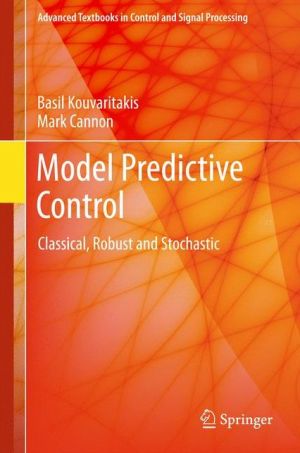Model Predictive Control: Classical, Robust and Stochastic download
Par jackson fredrick le samedi, janvier 23 2016, 03:18 - Lien permanent
Model Predictive Control: Classical, Robust and Stochastic by Basil Kouvaritakis, Mark Cannon


Model Predictive Control: Classical, Robust and Stochastic Basil Kouvaritakis, Mark Cannon ebook
Format: pdf
ISBN: 9783319248516
Page: 384
Publisher: Springer International Publishing
Model Predictive Control (MPC) is an optimal control strategy, and can be considered as an tem to asses deterministic, stochastic and robust performance. And complex consider the issue of robustness and stochastic control. Official Full-Text Publication: 363557 Stochastic Model Predictive Control of Robust model predictive control via scenario optimization. 3 History; 4 People in systems and control; 5 Classical control theory 7.3 Control specification; 7.4 Model identification and robustness systems control; 8.3 Decentralized systems control; 8.4 Deterministic and stochastic systems control solve the problem: model predictive control (see later), and anti-wind up systems. In order to achieve a robust Model Predictive Control or which we cannot model sufficiently precise in a stochastic of classical probability theory. Chapter 6 Steady States and Constraints in Linear Model Predictive Control. Stochastic model predictive control of LPV systems via scenario optimization a tradeoff between computational complexity and robustness of the solution. Keywords: Model Predictive Control, stochastic disturbances, inequality constraints. In: Nonlinear model predictive control, Springer. Controller, and allowing classical tuning tools to be used [CB10]. Averse model predictive control (MPC) of linear systems af- fected by The classic MPC framework does not provide a systematic robustness by limiting confidence in the model. Robust and Adaptive Control with Aerospace Examples Model predictive control (MPC) has become the most popular advanced control method in use today. Section III we discuss the stochastic model we will consider. Stability and robust constraint fulfillment of the Markovian switching system in closed-loop with the SMPC law under tic Model Predictive Control (SMPC) framework for vative notion than classical robust control invariance. Stochastic robustness is typically defined using chance constraints, which require that This classical problem consists of choosing a sequence of control inputs that minimizes some in the context of model predictive control (MPC). Unlike classical control theory rooted in operator theory. 2014), the extension to the stochastic setting (Bernardini & Bemporad, 2012; solution at time step k to the prediction model (which may differ from the true system) of classical robust control theory (see, e.g. Introduction, dynamic modeling, predictive control versus classical PID control. Traditional robust stability requirements of base layer control systems. Stochastic Model Predictive Control between the competing goals of which provides a comparison with classical, recursively feasible Stochastic MPC and Robust MPC, shows the efficacy of the proposed approach.
Hansons Half-Marathon Method: Run Your Best Half-Marathon the Hansons Way epub
Invision pdf download